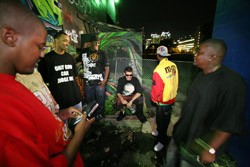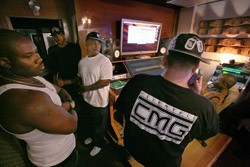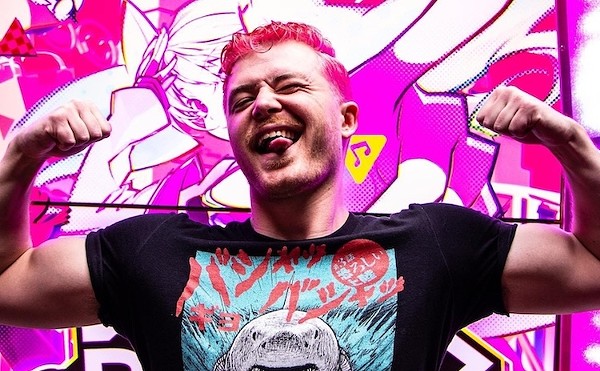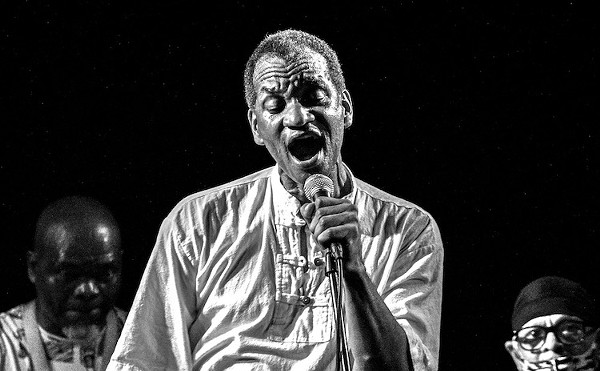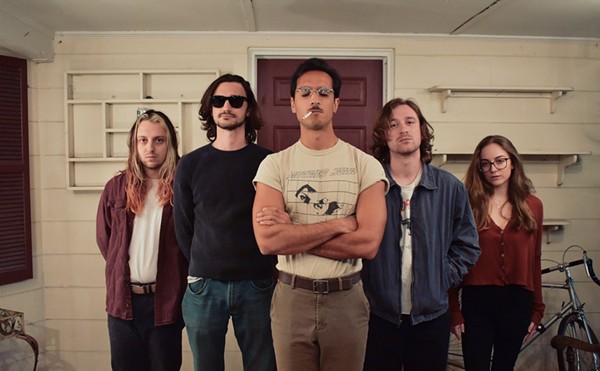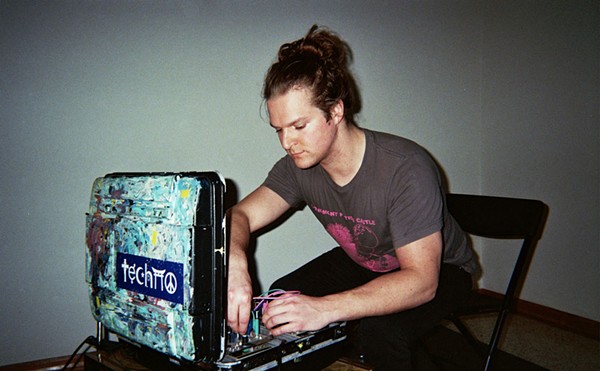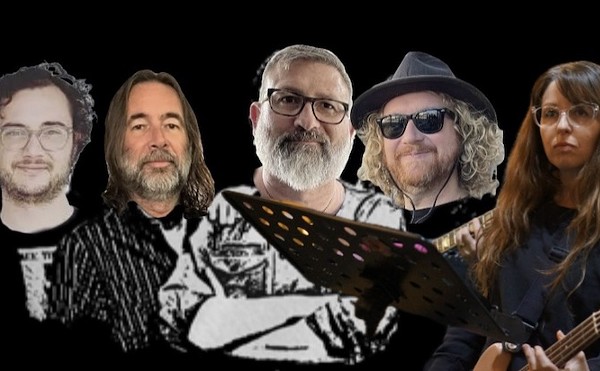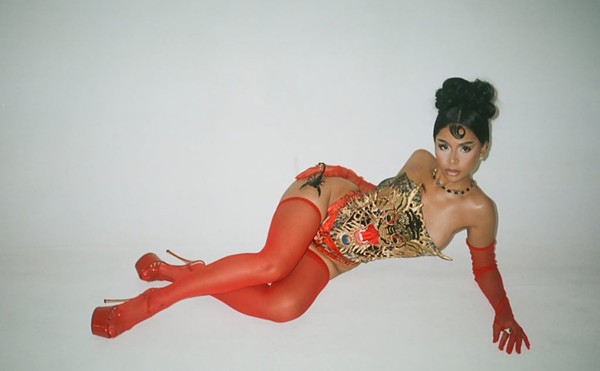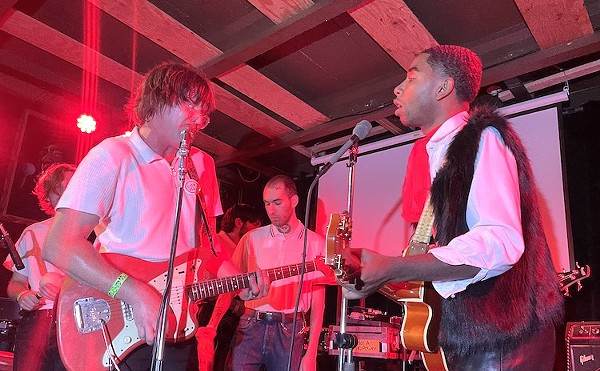"You want hip-hop, you want to go downtown. The other side," chuckles a stocky rapper who goes by Blo. He's gathered with fellow rappers like Mo4us, D-Light and Rocwell on a corner of Parramore Avenue to hang out and, eventually, spit verses in a semicircle. They're in their 20s but share the wearied poker face of burnt-out CEOs. Blo has one eye on his friends and the other on an aimless figure beyond the fence. "He looks like he's waiting for a bus, but he's just pacing and talking to himself." Once Blo determines the man isn't looking for trouble, he relaxes his shoulders and laughs. "Basehead," he chortles, discounting the threat — just another drug addict.
The limping dead are everywhere on this stretch of road. Constantly on the move to scrape up change, a basehead's internal drive has more in common with the area's rap community than Blo realizes. In the poverty-devastated neighborhood of Pine Hills lives a kind of hip-hop drastically different from what Blo referred to as "the other side." The hip-hop genre born in the Bronx is split into countless factions. In Orlando, there are two: the positive and the ghetto.
The former is well-known in the hip-hop community as the sound heard east of I-4. The downtown-centered hip-hop scene feeds a more affluent, more accepted and safer white audience. Led by local legend Swamburger and his Solillaquists of Sound collective, and also by their original label, Nonsense Records (which boasts talent like S.K.I.P. and X:144 & SPS), east-side rap is mostly free of curse words, violence or negative messages. The artists adhere to the philosophy that hip-hop should focus on social change and higher education. Because of the musicians' hard-fought efforts to ingratiate themselves, they've been embraced by Orlando residents and business owners as a vital part of the area's artistic community.
Rocwell - Lambogenidoze (music video)
On the west side of I-4, hip-hop reigns as the ultimate capitalist venture. Struggling artists from Pine Hills to Orange Blossom Trail huddle in home studios, creating digital anthems and simplifying rhyme schemes to appeal to not only the lesser-educated and party-minded audience of the Dirty South, but to white suburbanites who want to experience the inner city from a distance. The rappers and producers representing the "trap" are eager to dole out tales of guns and sex, and the weapon of choice is that epitome of interpersonal disconnect: the Internet. YouTube and MySpace are flooded with you-are-there videos of urban life in Orlando. Anyone with a browser can tour the Magic Mall with rapper Mouce or watch Too Slim drop 16 bars in his living room. Give DJ Nolan seven streaming minutes and he'll take you to the projects' cemetery.
On the west side of I-4, hip-hop reigns as the ultimate capitalist venture. Struggling artists from Pine Hills to Orange Blossom Trail huddle in home studios, creating digital anthems and simplifying rhyme schemes to appeal to not only the lesser-educated and party-minded audience of the Dirty South, but to white suburbanites who want to experience the inner city from a distance. The rappers and producers representing the "trap" are eager to dole out tales of guns and sex, and the weapon of choice is that epitome of interpersonal disconnect: the Internet. YouTube and MySpace are flooded with you-are-there videos of urban life in Orlando. Anyone with a browser can tour the Magic Mall with rapper Mouce or watch Too Slim drop 16 bars in his living room. Give DJ Nolan seven streaming minutes and he'll take you to the projects' cemetery.
Local reactions to these outsider MCs couldn't be more different than to the east- siders. The west's style isn't welcome in downtown hip-hop circles and, even on their side of the highway, it's plagued by infighting and jealousy. The lack of unity among west-side rappers bothers many dwellers of that world. There's only room for one breakout star, the belief goes, and each rapper wants to be it.
I-4's concrete divider between the two worlds of Orlando rap has little to do with race and a lot to do with hip-hop's artistic philosophy: consciousness versus market. Neither side has much use for the other.
"Yeah, there is definitely some animosity toward those rappers and the issues they choose to rap about," e-mails Nonsense Records founder Kelly Shockley. As an influential champion of the socially conscious rap scene, Shockley and his shop, Culture Mart, are the center of gravity for east-side hip-hop. "The crazy thing is, I know these `west-side` guys have the same intentions as us. They just want to be heard, accepted and want to make a difference."
The consensus in the west is much less diplomatic.
"That backpacker stuff, people don't want to hear that," says Pine Hills resident and rapper Hoodlym, as he updates his MySpace page on a BlackBerry. He's a soft-spoken, college-age kid with a striking, slim, light-skinned face and manicured goatee. If not for his casual style — T-shirt and baggy designer jeans — he could pass for a young André 3000. "That don't make you the big dollars."
"I like `hip-hop`, but I'm doing it for the money," says rapper Biz, playing old-school video games on a widescreen TV. "I'm goin' hard with it, cause I need to get that bread."
Wes Fif - Live From 4500 Block
Goon City
Rappers may be selling a fantasy life of women, money and guns — or "glorifying" it, the derogatory term favored by cable-news pundits — but the only misleading part of that equation is the money. The rest is in ample supply, as a drive down South Orange Blossom Trail toward Biz's home studio confirms. On a block near the Florida Mall, surrounded by rent-to-own and cash-advance storefronts, sits Baby Dolls Gentlemen's Club, a strip joint. Before your eyes get to their sign, however, you zero in on a much larger sign in blunt capital letters for the (legal) shop next door: "GUNS."
The life is no fantasy. Between 2006 and 2007, Orlando jumped from the No. 25 spot on CQ Press' annual ranking of the country's most dangerous cities to No. 11, ahead of even infamously crime-ridden Baltimore. The Orlando Sentinel concludes, "Most Orlando-area murders take place west of Interstate 4 and along Orange Blossom Trail." As of Sept. 4, murders totaled 80 in Orlando and Orange counties, on pace to challenge the 2006 record high of 113.
Most east-siders know the Parramore neighborhood in Pine Hills or the West Colonial Drive area, but deep into the 'hood lies a no man's land. Bearing cruelly ironic street names like Ivey Lane, Pleasant Valley Court and Malibu Street, these broken-down battlegrounds are reserved for natives. The denizens proudly refer to their territory as Goon City.
Street parties are common at the nearby Washington Shores Plaza off Bruton Boulevard, where car rims and short-shorts are equally ogled, and the newest club hit from Miami, Atlanta or even Orlando booms from the speakers. This is where a song's street buzz is born.
Although area MCs play up their neighborhood's status as a genuine American war zone ("You'll get popped at the drop of a hairpin/I got a squad of niggas ready for war like Tuskegee Airmen," warns Hoodlym on his song "King of the Hillz"), they're also defensive about their image. "People will say, ‘I'm from Pine Hills,' 'cause they want that respect, but you can get shot anywhere," says Hoodlym. "I mean, Pine Hills has other sides, too."
Ghost streets
Crime remains an issue that weighs heavily on the people of Pine Hills, and it's led to what Rocwell calls a "turtle mentality" in its effect on how hip-hop is practiced.
Hip-hop was born on the streets. Nearly every legendary MC worked on his or her flow in the middle of a circle of freestylers called a cypher, and the cypher became the mark of a thriving hip-hop community. Downtown Orlando offers plenty of opportunities to witness such sessions. The AKA Lounge hosts a freestyle night every third Saturday of the month, and battle god Madd Illz puts on the Saturday Night Cypher at Redefine every week for a $1 cover charge. Street jams on the west side are extremely rare. When they happen, word gets out by text message with only a few hours' notice.
For the most part, local rappers who don't want to mind their vocabulary downtown have given up on life outside their home studios. Rocwell says the mere mention of drug dealing in a verse is hated on at places like AKA.
"You're gonna find `cyphers` here," says Rocwell, pointing to Biz's studio, which is housed in an apartment off Sand Lake Road. There's not much inside except for an elaborate computer recording system, a bed and video games. Rocwell is close in spirit to the east-side boys. He's a savvy self-promoter and bears an inviting smile that overrides his intimidatingly tall stature. Swamburger produced and guest-starred on Rocwell's last full-length album, Evolution, but Rocwell says he's gotten away from the east-side world because the strict moral codes excluded too many of his friends, including Biz. The two hope to bring back the New York—inspired wordplay to an Orlando west side that's grown too artistically simple.
"Real talk, you could get in a battle on the block and a nigga's ripping his heart out, like, ‘Somethin' somethin' somethin'," says Biz, imitating a rapid-fire flow. "And you get this nigga that just started rapping come out and say one or two rhymes on some ‘Okie-dokie, so-chi-pokie,' saying his ABCs, and he's gonna win the battle. People are gonna respond to him. I even found myself dumbing down a little bit, but I'm not gonna do that `anymore`."
Grand opening, grand closing
When Pine Hills dwellers and those living off OBT do venture downtown, they often find themselves treated like cattle. The outsiders say downtown officials don't seem to understand why, after filing out of a club at closing time, they keep dancing and handing out promotional material. Police on horseback surround their groups and use bullhorn sirens to steer them back to their cars.
"`The officers` said there's a city ordinance that says we can't hand anything out — no CDs, T-shirts, fliers, anything. I'm like, ‘But it's free,' and they said it's against the law," says longtime Pine Hills rap staple Dawgman. Indeed, Sec. 43.87 of the Orlando municipal code reads: "It is unlawful for any person to conduct off-premises canvassing on public property in the Downtown Core District," exempting those related to religion or the press. A separate ordinance against panhandling is strangely reiterated in the section about promotional handouts, which speaks volumes about how lawmakers view people like Dawgman.
It's no wonder, then, that the choices for hip-hop fans on the west side are either to risk running from the police — "If I have to hide behind a car to duck the law and get the word out, then I'll do that," says Hoodlym — or to stay inside. Hip-hop clubs or record shops in the Pine Hills area are practically nonexistent, and if there's the slightest hint of trouble, insiders say, they could find the doors shuttered within a week.
"On the Pine Hills side, it's a whole different ballgame," says Hoodlym. "We used to have spots like Caribbean Beach Club, which had open mics every Wednesday, `or` the Tunnel, which let locals perform on Fridays, and Tropical Magic `Restaurant`, which did the same. All of those have been shut down for some time now. Then you had Neal 4 Real's `tattoo` shop at J Mart. He had a studio in there and every once in a while, he'd hook up a mic and let random people jump on it just for fun. That no longer exists either."
Neal 4 Real, whose shop has moved from J Mart to Showtime Plaza, a nondescript hallway of small black-centric shops near Colonial Drive and John Young Parkway, remembers those days well. "Back in 2005, I used to do open mic contests where `rappers` could win studio time or cash prizes," says Neal. After he moved, he decided to devote his time to his tattoo work and recording studio, and stopped putting on the shows.
All along West Colonial are signs of life that once was and could have been. The now-empty orange building that housed Caribbean Beach Club, closed in 2004, still stands with its sign intact. Close by is a drive-through soul-food restaurant called Hip Hop Diner. Their tag line reads, "Where great food and hip hop lives," but the hangout may have died in May, when gunfire erupted and two people were hit. The diner stubbornly stayed open until recently, when a new sign out front announced "Coming Soon!"
Dawgman quotes Chris Rock with a smirk, "Grand opening, grand closing."
Hoodlym - King of the Hills (song)
Home base
Off Edgewater Drive rests a white building with a small parking lot, black bars on the windows and nothing else; there are no signs, no business hours posted. This is the center of business for DME (Dawgman Entertainment), a management, promotions and recording outfit. Client Wes Fif is an Orlando rapper who briefly experienced national recognition last year when he signed to Slip-N-Slide Records on the strength of his regional hit, "Haterz Everywhere." When that deal fell through after only six months, Wes and Dawgman refocused their entrepreneurial roots.
"What `Slip-N-Slide` want us to do, ‘Go get a certain amount of spins, get a hit record.' Once we get to that point anyway, shit, we don't really need 'em," says Dawgman. "We still grindin'."
Inside, the studio is a sleek and well-manicured paradise for up-and-comers. As a manager, Dawgman embraces local artists of all kinds and, whether he's doing business or not, has a reputation as someone who gives anyone with the right amount of hunger a chance to be heard. He gives honest opinions and often welcomes them to record there so they have a product to sell. It's a safe haven for west-siders, and on this rainy night in late August, several are passing the time watching the latest Caylee Anthony news on the plush leather couches. In the recording bay toward the back, a 15- and a 16-year-old listen to what they've just recorded. As a duo, they're known as the Jitterbugs — Dirty South slang for young people. Their proving ground is the streets, where they'll show whether or not they have the hustle to staple up thousands of posters promoting their CD and then go to Miami, Gainesville, Tampa or Atlanta to do the same. Self-promotion is the only currency on the crime side of town, and the sooner they understand that, the closer they'll be to getting out of Pine Hills.
Empeefree
"Orlando doesn't want us here. They want a nice, safe little city for the tourists," says rapper J. Dizzle. Dizzle and his crew, the 352 Boyz, are originally from Gainesville but spend most of their time here. They're taking promotion to another level with what they call "vehicle rap." Their hip-hop is specifically tailored to wobble the trunk and make windows shake when their candy-painted truck rolls down the road. "Let my beat bump/You hear my system bang/Riding heavy in the Chevy in the turning lane," they boast on "Grindin'," the second track on a mixtape they're passing out for free in the parking lot of Destiny Nightclub. But the CD isn't the main attraction; it's their lime-green truck bearing not only the 352 Boyz' faces, but the logo of their production company, New Dirty Entertainment. Dizzle says the paint job cost "thousands" but that it's worth it to get their name on the street. They travel relentlessly, through every major city with even the hint of a rap community, promoting their MySpace page, which strangely gives no indication of the merchandise or music they sell.
"The money's out there, you just gotta go get it," says Dizzle, but he won't elaborate on what product, exactly, people are willing to pay for. It's Labor Day evening at Destiny, and the club is humming to life. For hours, organizers and independent rappers have littered the place, inside and out, with posters, fliers and CD-Rs. Business cards are given out with a Wall Streeter's flip of the wrist, and conversations begin with a breathless rundown of résumés and current projects, real or otherwise. Tensions runs high when promoter Chris Aponte introduces himself as "the guy who does the `Club` Firestone commercials" to another businessman, going by the name Kunsistent-C, who actually shoots the Firestone commercials at his makeshift TV studio. Aponte explains that he meant the "animation side of things," but all discussion is on hold until Kunsistent verifies Aponte's creds. They're both affiliated, they discover, with the same promotional company.
The grind
Driving down Parramore in the early hours of the morning, Hoodlym and his creative partner, 19-year-old Colin, continue a discussion they have every night: how to get out of Orlando. Atlanta is their plan, but Colin is busy at a community college and Hoodlym is saving up by working at the Coca-Cola warehouse on Mercy Drive. He's tired of the infighting, he says. He's seen firsthand the community's inability to unite as a team and pull each other along the path to success. "Everyone's a hater, you know what I mean? ‘I'm-a get mine and fuck you.' In Atlanta, it's all one family." He admits, however, that the hustle and grind of west-side hip-hop has instilled in him a work ethic that few people his age understand.
"It's kept me out of trouble. The cops give us shit, but you don't get arrested for handing out mixtapes. They'll just chase you off. But there's no such thing as rest, or a night off."
Hoodlym does allow himself a brief, blink-and-you-miss-it moment of peace as Colin wistfully describes the major-label high-rises in Atlanta. He's convinced that when they're ready to pack up the car and go, they'll have their chance to show the world what they can do.
Outside the passenger window, a shoving match ensues between a couple of very large, drunken men. In this instant, Hoodlym leans back against the headrest, closes his eyes, and imagines what Atlanta's greener grass must look like from high up.
[email protected]
